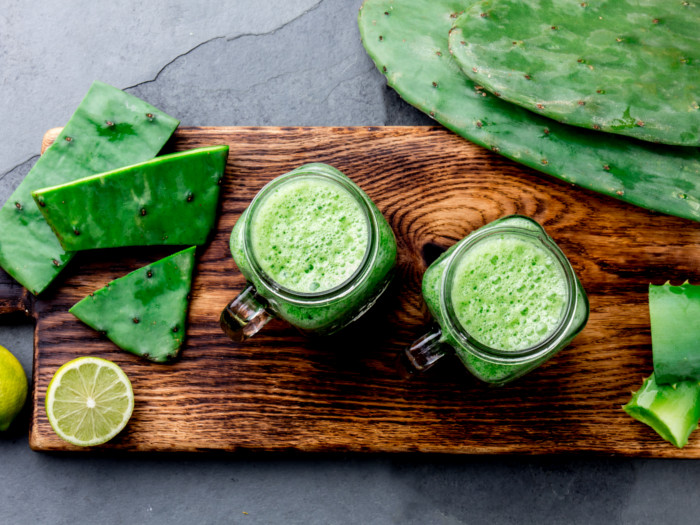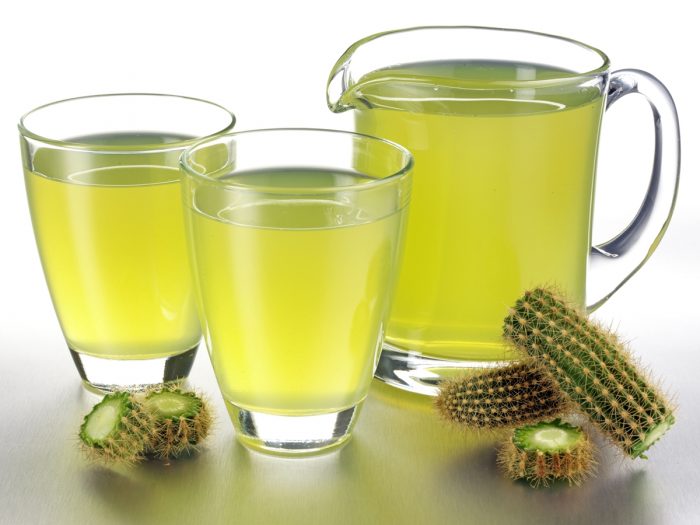If you want to try an exotic vegetable juice, cactus juice is an excellent option, as it has a long list of potential health benefits, incredible nutrient density, and various powerful antioxidants.
What is Cactus Juice?
Cactus juice is known by many different names, including prickly pear juice or nopales juice. All of these names refer to the natural juice of the prickly pear cactus. There are more than a hundred different species in the Opuntia genus but many of them share similar physical and nutritional profiles. Native to the Americas, the prickly pear cactus was first naturalized in Australia and has since spread to many other parts of the globe. It is believed that cactus juice has been a part of indigenous people’s culinary practices for thousands of years.
Cactus Juice Nutrition
Cactus juice is a good source of vitamin C, B vitamins, iron, calcium, beta-carotene, magnesium, amino acids, and other phytonutrients. It is also extremely low in calories. [1]
Extracting cactus juice requires a bit more effort than most other vegetable juices, but it is well worth the effort, provided you can find the appropriate prickly pear cactus pads to make the juice. You can purchase your cactus juice in certain exotic food stores. However, it can be expensive and also packed with additives or sugars. Making your own allows you to be creative with other ingredients and enjoy the many health benefits of this juice at a fraction of the price.

Fresh cactus juice Photo Credit: Shutterstock
Benefits of Cactus Juice
The top benefits of cactus juice may include its possible ability to aid in weight-loss efforts, ease digestion, reduce inflammation, lower blood pressure, relieve menstrual cramps, manage diabetes, lower stress, improve cardiovascular health, reduce your risk of cancer, and more.
May Aid in Weight Loss
Cactus juice is known to be extremely low in calories, about 15 per cup, which may mean you can drink quite a bit of this juice without it affecting your daily intake of calories. However, it does have the potential ability to fill you up and deliver several key nutrients, so you can prevent snacking and overeating without compromising your diet! [2]
Might Improve Digestion
This juice has been recommended for intestinal problems for centuries, as it can form a protective layer in the gut that may lower inflammation levels and soothes the discomfort of irritable bowel syndrome, diverticulitis, and colitis. It is also thought by some to help clear up problems with constipation, bloating, and cramping, as it clears out the colon and digestive tracts. [3]
May Help Manage Diabetes Under Cataract Development
A study in the Saudi Journal for Health Sciences shows that regular intake of cactus juice may help protect the body from oxidative damage. It may also weaken cataract development as a complication of diabetes by decreasing blood sugar levels, reducing oxidative stress, and restoring the activity of antioxidant enzymes. [4]
May Have Anticancer Potential
A 2009 research study published in the Plant Foods for Human Nutrition tried to find the impact of nine varieties of prickly pear cactus juices on cancer cells. It revealed that certain types of prickly pear juices, rich in antioxidants like phenolics, flavonoids, betalains, help in inhibiting the growth of colon as well as prostate cancer cells. More research is still required to know the implications for these findings, and if the same can be used for other types of cancer. [5]
Might Lower Blood Pressure
There are impressive levels of potassium found in cactus skin. Fresh cactus juice has the potential for being part of a heart-healthy diet aiding in for lowering blood pressure and symptoms of hypertension. This can lessen the strain on your heart, and lower the chances of heart attack and stroke. [6]
May Act as Anti-inflammatory Agent
If you suffer from conditions like arthritis, gout, inflamed bowels, headaches, chronic muscle pain or high oxidative stress levels, the potentially anti-inflammatory properties of this juice may be precisely what you need, according to one animal study. The phytochemicals and other antioxidants that may be present in the juice provide most of these soothing benefits. [7]
Can Be A Potential Hangover Cure
Over the years, countless people have sworn by this juice as the ultimate hangover cure. Alcohol in excess can cause or exacerbate inflammation, and cactus juice may directly counter this, while also addressing some of the most common symptoms of a hangover, such as nausea and headaches. [8]
May Relieve Menstrual Cramps
The potentially anti-spasmodic nature of the active ingredients in cactus juice makes it a popular home remedy for women experiencing painful menstrual cramps. This juice is said to act rapidly to eliminate abdominal discomfort and tightness, and also relieve stress and anxiety that often accompanies a woman’s period. More research on the efficacy of this claim is needed but is worth a try by those suffering during menstruation. [9]
May Reduce Stress Levels
If you suffer from chronic anxiety or stress, some of the active ingredients found in this juice may mimic the effects of cortisone, according to one study. Some research on mice was found to effectively lower stress hormone levels and calm the mind, helping you focus or relax, and even get a better night’s sleep. [10]
How to Make Cactus Juice?
Making cactus juice at home may sound daunting, but it is not much more complicated than blending or juicing a normal vegetable. As mentioned, there are more than a hundred species of prickly pear cactus. In all cases, the most important thing is to remove the spines from both the pads and the rounded fruits. Mature pads and fruit will contain the most diverse and stable range of nutrients. To improve the flavor of the juice, many people add other citrus fruits to increase sweetness and palatability.

Cactus Juice Recipe For Good Health
Ingredients
- 2 large cactus pads (or 2-3 prickly pear fruits)
- 1 cup coconut water
- 2 oranges
- 1 lemon
Instructions
- To make cactus juice, start with removing any spines still stuck in the pad with tweezers or a knife.
- Bring a pot of water up to a boil and then drop in the two cactus pads.
- Allow them to steep for 3-4 minutes, as they will begin releasing their juices
- Remove the pads carefully and let them cool.
- Peel the pads and chop them into small cubes.
- Add the chopped cactus to your blender, along with the oranges, lemon and coconut water.
- Blend thoroughly until the consistency is even.
- Place cheesecloth over a bowl or container and strain the blended mixture through it.
- Press on the cactus pulp in the cheesecloth, removing as much juice as possible.
- Discard the cactus pulp, refrigerate the juice, and serve chilled!

Side Effects
Cactus juice can be a wonderful addition to your health regimen, but there are some potential health risks and side effects of which to be aware. Before using this nutrient-rich drink, it is best to speak with your doctor about your specific risk factors.
- Hangover: Although many people consider this beverage a hangover cure, those with sensitive stomachs or severe reactions to alcohol may find that the juice makes the symptoms worse, including more painful headaches and additional gastrointestinal distress.
- Diabetes: The juice is thought to have blood sugar-lowering ability, but people with low blood sugar, or those on medication for the condition, could experience dangerously low levels of blood sugar, causing weakness, cognitive confusion, and even fainting.
- Stomach Issues: Common side effects for people who are not used to drinking the juice may include GI issues including nausea, diarrhea, cramping, bloating, and other types of gastrointestinal distress.
- Drug Interactions: Experts do not recommend drinking the juice before taking daily medications, as the juice may inhibit many drugs, particularly those for kidney, liver, and pancreatic conditions.
